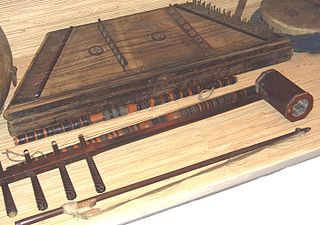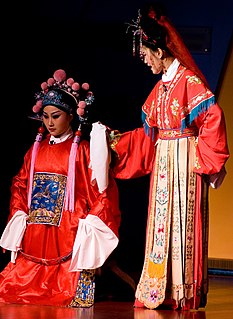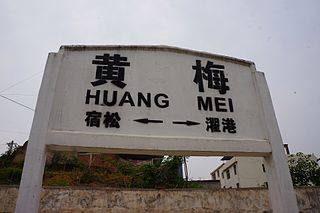
Hubei is a landlocked province of the People's Republic of China, and is part of the Central China region. The name of the province means "north of the lake", referring to its position north of Dongting Lake. The provincial capital, Wuhan, serves as a major transportation hub and the political, cultural, and economic hub of central China.
Errenzhuan or two-people rotation is a genre of local folk dance and song from Northeast China, usually involving two performers. The dance uses folded fans or square-shaped red handkerchiefs, which are twirled as the songs are performed. It is popular due to its comedic dialogue and sketches, which have obfuscated the old dances and songs.

Anhui is a province of China, known musically for a wide array of folk and classical styles. The Huangmei opera, though originally from Hubei, has a long history in Anhui, especially Anqing City, from which it spread to Beijing, Shanghai and elsewhere. A notable Huangmei opera figure was Yan Fengying. Huangmei opera has become internationally renowned, especially following the 1986 performance of an adaptation of William Shakespeare's Much Ado About Nothing by the Anhui Provincial Huangmei Opera Troupe. There is also a less common form of Hui opera.

The sihu is a Chinese bowed string instrument with four strings. It is a member of the huqin family of instruments.

Huangmei or Huangmei tone originated as a form of rural folk song and dance that has been in existence for the last 200 years and possibly longer. Huangmei opera is one of the most famous and mainstream opera in China. The original Huangmei opera was sung by women when they were picking tea, and the opera was called the Picking Tea Song. In the late Qing dynasty, the songs came into Anhui Province— Huaining County adjacent regions, combined with the local folk art, Anqing dialect with singing and chants, and gradually developed into a newborn's operas. The music is performed with a pitch that hits high and stays high for the duration of the song. It is unique in the sense that it does not sound like the typical rhythmic Chinese opera. In the 1960s Hong Kong counted the style as much as an opera as it was a music genre. Today it is more of a traditional performance art with efforts of revival in mainland China, Hong Kong, and Taiwan, and mostly sung in Mandarin.
The Epic of Darkness is a collection of tales and legends of primeval China in epic poetry, preserved by the inhabitants of the Shennongjia mountain area in Hubei. It is composed of numerous Chinese myths relating to the creation of the world, containing accounts from the birth of Pangu till the historical era. It dates back to the Tang Dynasty of China. It was translated and published by Hu Chongjun after the discovery of a manuscript in 1982.

Huanggang is a prefecture-level city in easternmost Hubei Province, China. It is situated to the north of the middle reaches of the Yangtze River and is bounded in the north by the Dabie Mountains and is named after Mount Huanggang. It borders Henan in the north, Anhui in the east and Jiangxi in the south.

Huangmei County falls under the administration of Huanggang City in eastern Hubei province, People's Republic of China, and borders Anhui to the east and Jiangxi to the south across the Yangtze. It also administers Shanjia Islet (单家洲) in the Yangzte.
Wang Qing is a fictional character and antagonist in Water Margin, one of the Four Great Classical Novels of Chinese literature. He is one of the three rebel leaders in the Song dynasty along with Fang La and Tian Hu, that the Liangshan heroes have to defeat in the final chapters of the novel. He only appears in the longest versions of the stories which include these extra chapters.
A Tea-picking opera is a form of musical entertainment.

Yu opera, or Yuju opera, sometimes known as Henan bangzi, is one of China's famous national opera forms, alongside Peking opera, Yue opera, Huangmei opera and Pingju. Henan province is the origin of Yu opera. Henan's one-character abbreviation is "豫" (yù), and thus the opera style was officially named "豫剧" (Yùjù) after the founding of the People's Republic of China. The area where Yu opera is most commonly performed is in the region surrounding the Yellow River and Huai River. According to statistical figures, Yu opera was the leading opera genre in terms of the number of performers and troupes. While Yu opera is often called “Henan opera” in English, within Henan it is considered to be just one of the province’s three most important forms of opera.

This is a timeline that show the development of Chinese music by genre and region. It covers the historic China as well as the geographic areas of Taiwan, Hong Kong and Macau.

Huangzhou District is an urban district of Huanggang, Hubei province, China.
Zhao Xinchu (1915–1991), birth name Shuai Qitai or Shuai Yinghai, courtesy name Qitai, was a Chinese politician, born in Huangmei County, Hubei Province. He was the Communist Party of China Committee Secretary and Governor of Hubei.

The culture of Hunan (湖湘文化) refers to the culture of the people based in the Hunan province of China. The mountainous terrain of Hunan separates it from the surrounding Chinese provinces, resulting in its own distinct characteristics. As the Xiang River runs through the province from south to north, Hunan is called "Xiang" for short and boasts its "Xiang Cuisine", "Xiang Embroidery", "Xiang Opera", and "Xiang Army". Therefore, the culture of Hunan is also called the Huxiang culture. The culture of Hunan is originated in Chu (state) culture from the Zhou dynasty. The meaning of Hunan culture contains two aspects. Generally speaking, it refers to the sum of folk customs, social consciousness, scientific culture, and material culture that have been created in the long-term history of people of all ethnic groups in Hunan. In a narrow sense, it refers to the spirit that developed and accumulated on this basis.

Wuzu Temple is a Buddhist temple located on the Eastern Mountain, in Wuzu Town of Huangmei County, Hubei, China.

Xiju, also known as Wuxi opera, is a genre of opera which originated in the southern region of the Yangtze River Delta in China. It evolved from "Tanhuang" (滩簧), a folk opera art in the region of Wuxi and Changzhou of Jiangsu province. As one of the main local operas in Jiangsu Province, Wuxi opera has been reputed as "a piece of plum flower in Taihu Lake", a title given to the three major operas in East China, alongside Yue opera and Huangmei opera.
Xing Xiuniang was a Chinese farmer-turned-Chinese opera actress from Qing-dynasty Huangmei County, Hubei Province. In the early Daoguang period (1820–1850) she also lived and performed in Jiangxi Province. She was famous for her beauty and talent, but almost no written records on her life have survived because her fans were almost all illiterate farmers and laborers.

Xifu, also known as Chinese opera costume in English, are the stage clothes and attire worn in Chinese opera, such as Kunqu, Cantonese opera, Beijing opera, Huangmei opera. Some of these costumes bear some resemblance to the Hanfu system but also show some differences in terms of clothing ornaments and decorations, as well as colour system, and in design and construction. In 2006, the techniques used to produce Beijing opera costumes were included in the national intangible cultural heritage list.













